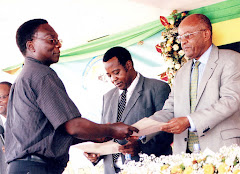Monday, April 27, 2015
Tanzania to intensive security at Dar port
Tanzania government has ensured security and smooth facilitation
of imports and exports to fellow East African member states. It has been
learnt. Acting Tanzania Ports Authority (TPA) Director General Awadh
Masawe said last week in Dar es Salaam that, his authority
has instituted an integrated electronic security systems to be controlled at
its newly 35 storey building which is currently in final touches. He
said during the occasion of demolishing old sheds at the port as a symbolic
program to kick start the multi billion worth of a project aimed to modernize the
infrastructural upgrades targeting the expansion of the Dar es Salaam Port that
would handle 22 million metric tones by 2020. The project dubbed Dar es Salaam
Maritime Gateway Modernization (DMGM) project, is backed by World Bank and
Department for International Development’s 596 million US dollars (over
1.1bn/-) as soft loan and grant, will see the country’s prime port improve
infrastructure and manpower.
He said the cost for installation of security
systems is $ 600 million which his authority has spent for the purpose that he
is optimistic it would reduce to a greater extent the rate at which theft had
been taking place within the yard in the past years. However, he noted that,
currently there is in use a scanning programme of the integrated machines which
is used for containers which are being off loaded and packed for exportation. Describing
about the DMGM project which is part of Big Results Now initiative will include
modernising and upgrading of Berth 1 to 7 from 9 to 13 meters in order to
accommodate more ships. He said many ships do not anchor to Tanzania because of
its shallow depth and that there ids a need to made a reform in order to
attract customers from landlocked countries from using other ports. He said
efficiency at the country’s major sea gateway has continued to improve under
BRN, adding that the cargo handled last year peaked over 14 million metric tons
against the target of 31.5 million tons. “Our target is to handle 18 million
metric tons by 2016/17 season,” Mr Masawe said while pointing out that under
phase one of the project, with funding from Trade mark East Africa and TPA, the
work will involve construction of access roads to Gates 5 and 8 to dual
carriageways.
Monday, April 20, 2015
Govt imposes stringent new measures to curb illicit drug trafficking
Despite having a series of changes on laws to curb
the illegal use of drug barons in the country, the government has continued to review
some of the penal codes so as to impose harsh punishments with a view to deter
drug users and dealers who facilitate cross border illegal business deals. The Attorney General (AG) George Masaju
clarified the matter on Friday last week in Dar es Salaam and noted that, changes
of the new penal codes have been analysed in the Drugs Control and Enforcement
Act 2015 recently passed by National Parliament. He said at a function of
presenting certificates of attendance to 18 journalists who underwent a seven
month short training course on reporting on illicit drug trafficking as well as
on reporting on areas of Millennium Development Goals. The short training courses
which were sponsored by Tanzania Media Fund (TMF) in collaboration with the
United Nations office in Dar es Salaam started in May 2014 and ended in January
2014, aimed at giving capacity building to journalists. The essence of doing
this, he further noted is due to negligence and non compliance by some individuals
who do not want to show cooperation in support of the government’s move towards
eradicating the illicit drug use in the country and tracking across the border.
However, the AG noted that, despite having a law that prohibits the escalation
of the phenomena, still the situation is growing at an alarming rate an aspect
that it has tarnished a good image of the nation to the outside world. He said
that the first efforts by the government was seen in mid 1990s when the
Parliament enacted a law aimed to suppress an illegal business on illicit drug which
is under clause 95 of the Anti-Drug Act of 1995. Through this law the
government established Anti-Drug Commission which is under the Prime Minister’s
Office and officially started to charge its duties in 1997. In order to
facilitate the move the government established special branches in its institutions
and departments to curb illicit drug use and illegal trafficking.
The institutions
are the Police force, National security Agency and Tanzania Revenue Authority
(TRA). “Despite of all these efforts, still people are obstinate and do not
want to comply by the rules and regulations set that could deter them to stop
with immediate effect the malpractice”, he said. Some of the new penal codes
that the government has seen the need to introduce as severe punishments in
this new Act which is workable in both Tanzania mainland and Zanzibar. He
further added that, the current law in use has shown some discrepancies in it
as it does not give a deserved punishment according to the magnitude of a
mistake committed an aspect that lacks a weigh of righteousness, but the new
law has imposed minimum punishment should be a fine or imprisonment. He gave an
example saying that according to section 12 of the current law, the punishment
imposed to an individual found to have engaged in illegal cultivation of a farm
product that produces ‘Bhang’ is fined Sh. 1 million or a length of
imprisonment which does not exceed 20 years. The new law he said has imposed a
punishment of fine between Sh. 50 and 500 million and a maximum length of
imprisonment which should does not exceed 30 years for the same offence
committed. He further noted that, the punishment given to those who finance the
illegal drug business according to the current law is fine that amounts to Sh.
10 million. But according to the new law it has imposed the punishment of Sh. 1
million or an imprisonment which does not exceed 30 years and have the
culprit’s properties confiscated. Elaborating on the mistakes committed for
transporting illicit drugs, the current laws has waived out fines and
imprisonment punishments, and in the new laws the punishment imposed is only
life imprisonment only. “The aim of doing this is to minimize the possibility
of the offenders to be fined at all counts related to the offenses committed by
them which in turn the government has
seen that they find them easier to pay and quitted in courts of law once
arraigned to answer charges”, he said.
Govt assures security to investigative journalists
THE Government is preparing a bill that
would protect investigative journalists and those citizens who dedicates their
lives over the fight of illicit drug trafficking by exposing people who engage
in the illegal business which has become so rampant in the country. The
Attorney General George Masaju made the declaration yesterday in Dar es Salaam
when he officiated the graduation ceremony that culminated the handing over of
the certificates of attendance to 18 journalists in the country who had
undergone a seven month short training on combating drugs and illegal
trafficking in Tanzania and on Millennium development goals. The trainings were
sponsored by the Tanzania Media Fund (TMF) in collaboration with United Nations
Information office in Dar es Salaam, benefited eight senior journalists and ten
female journalists of various media outlets mostly of the electronic media and.
The eight female journalists are those
who won the 2013 Media Awards provided by the Media Council of Tanzania (MCT)
and who the TMF had promised to train on various areas that cover Millennium
Development Goals (MDGs) in the country. In his speech, the AG Masaju noted
that, the rationale behind the idea of preparing a bill which later would be
enacted in Parliament as a protective Act is to strengthen the intensive task
that would enable people to expose more mischief on drug baron deal which has
now become a global issue. “The government is preparing the bill and once it
would be passed into a law would protect journalists and other good citizens
who would expose such mischief in their publications as a way to facilitate the
fight and their identities would be concealed according to the laws to make
them safer”, he said. Some of the eight senior journalists who were awarded
with the certificates said that, had encountered lots of difficulties in practicing
their experiences attained after the training for the last two months and some
noted that were nearly stoned to death when chasing investigative stories. Others
maintained that were threatened to death together with their relatives while
were on the move to find out the truth about the situation in various places
they visited to carry an investigation. The Managing Editor of the Swahili
investigative tabloid called ‘Jamhuri’ Deudastus Balile said that, journalists
should not rely on the old style of writing news as the world has changed and
therefore journalists needs to cope with new styles that tells their own
stories. However, he noted that journalists have to risk out their lives and
take precautionary measures when chasing such stories as it is resentful to the
businessmen dealing with such illegal deal. He said that, care is greatly
needed otherwise the nation would continue suffer under the yoke of the few
greedy business people who would bring bad image to the nation if are not
tackled to stop the this illegal trade. Ndimara Tegamwage who was a mentor in
these trainings noted that fear should not overcome journalists when writing
such investigative stories, and called on editors of various publications to publish
such types of stories in their publications as a way to help the nation solve
the problem. However, he queried why no any journalists in the country who has
ever gone and asked the President about the issue who earlier on had confessed
himself to have known all illegal drug dealers in the country. Fili Karashani
who was also a mentor in these trainings noted that, there is high time for
Tanzania media industry need to be changed and focus more on the people’s life
as a way to promote the unprivileged groups. Karashani among the veteran
journalists in the country has a long history of journalism and cautioned
journalists to observe objectivity while reporting news.
Maize flour prices up in Dar markets
The
whole sale price of maize flour usually packed in a bag weighing 25 kilogramm and
sold to shop keepers in most Dar es Salaam city markets has risen up by 42
percent, the survey carried out by this blog can establish. A random survey carried
out in various municipal markets in city’s suburbs of Buguruni, Temeke,
Mwananyamala, Ilala and Gongo la Mboto markets shows that, the price of each
bag whose price remained stable for a number of months has shot up from Sh.
17,000/- to currently Sh. 23,000/-. Traders engaged in milling maize grains in
various posh mills and sell the flour to shop-keepers in packed small bags, attributed
the sudden rise is due to price hike of maize grains in upcountry regions. Zablon
Mlumbwa, the owner of a famous Super Sembe Dar posh mill located at Gongo la
Mboto on the outskirts of Dar es Salaam city said that, they are ought to
increase the whole sale price of a maize flour due to price rise of maize
grains in up-country supplying regions. He said hat, a kilogramme of maize has
suddenly increased from Sh. 450/- to Sh. 650/- in maize producing regions of
Iringa, Morogoro and Mbeya and Ruvuma regions respectively. The survey further
has discovered that, a retail price for a kilogramme of a maize flour could be fetched
at between Sh. 1,000/- and Sh. 1,300/- from Sh. 700/- and Sh. 850/- per kilo as
it was for the last two weeks.
Contacted for comments the Director of Food
security in the ministry of Agriculture Kasrim Mbambo could not be in a
position to talks about rthe matter as he is currently on annual leave, the
Guardian contacted him with view to know reasons why has there been a high
price rate of maize within a shortest time. However the Ministry’s Public
Relations Officer, Richard Kaswaga said that, during the month of April every
year, reserve of the previous harvests gets out of stock, an aspect that,
causes shortage of maize grains in most markets in the country. He further
attributed the sudden high prices might have been caused due to the supply of
such maize grains by farmers outside the country after the government had
allowed the farmers and other traders to do so following the abundance of over
2 million tomes of maize grains which were accounted to be in excess in the
country. He noted that, the National Food Reserve Agency (NFRA) had enough food
stock an aspect that the government allowed the excess to be exported by
traders in the country. Another reasons he attributed that might have been a
source of shortage caused is due to the freedom that the government t left for
farmers to do away with the maize products as they could not want to intervene
with producers in a move to opromote the Kilimo Kwamza initiative that could
give freedom to farmers to decide on what to do aboluit their crops.
Tokomeza report in President’s hands
PRESIDENT Jakaya Kikwete has received a
report of ‘Tokomeza’ and has hailed the
contents on the reports saying that the operation has come to an end, a
statement issued by the Directorate of the Communications at State House has
said. According to the statement, the report was handed to the President last week in Dar es Salaam by the Chairman of the inquiry commission Ambassador retired Hamisi
Amiri Msumi, which he has appointed on May 1st 2014. The President
gave the task to a commission to investigate various allegations that led to
the violation of laws and procedures during the implementation of the Tokomeza
operation which was conducted throughout the country that aimed at looking for
poachers and other crimninals at national parks. After receiving the report,
President Kikwete has assured the nation that it will be made officially known
to the general public in two weeks time from now and how it will be dealt with.
Either President Kikwete had given the task to a commission of proposing what
could be the legal steps to be taken against those who would be implicated directly
in the incidences that led to the violation of the legal rights during the past
operation. The President also had directed members of the inquiry commission to
advice on what should be the best way to be done in the implementation of the
operation like this one in future. The President also issued six major areas to
be concentrated on by the commission as it were highlighted in a government
statement No: 131 of the year 2014. These were as follows. To investigate how
the operation was conducted, how officers tasked to carry out the exercise
followed the right procedures stipulated in the law, principles and
regulations. Others were to see if the officers given the task followed the
directives issued to them and see if there were any people who violated the
rules and directives. Judge said to the President that, when performing his
duties his commission toured 20 regions and 38 districts and deceived numerous
complaints Then formation of t5he commission
followed the report which was issued in parliament last year by a Parliamentary
select Committee Chairman James Lembeli and which led to the resignation of
three ministers. The Ministers who were forced by the Members of Parliaments to
resign included the Minister for Home Affairs Dr. Emmanuel Nchimbi, the
Minister for Defense, Vuai Shamshi Nahodha nd the Minister for Tourism and
Natural Resources Hamisi Kagasheki.
Subscribe to:
Posts (Atom)












